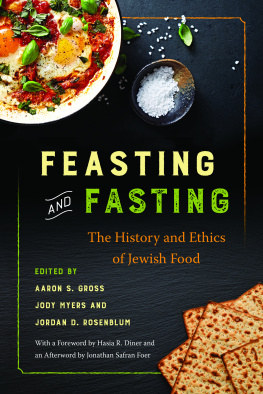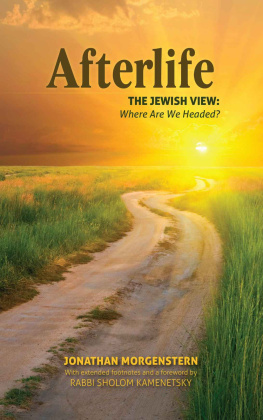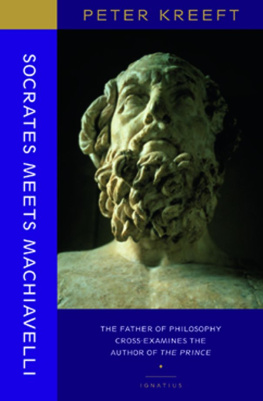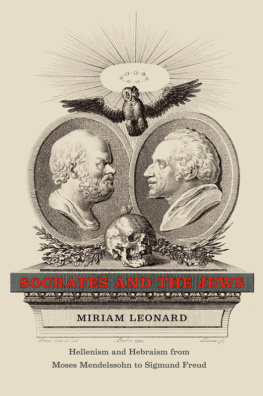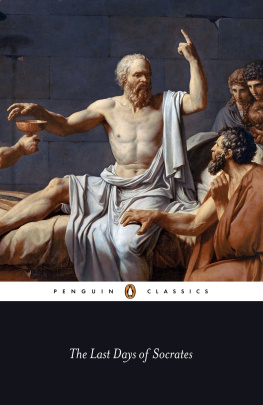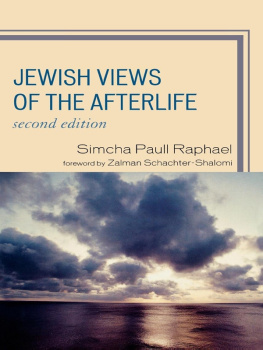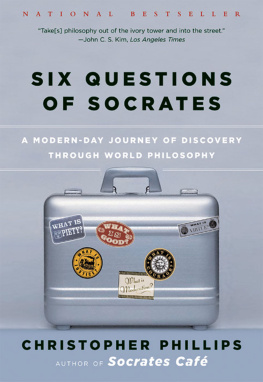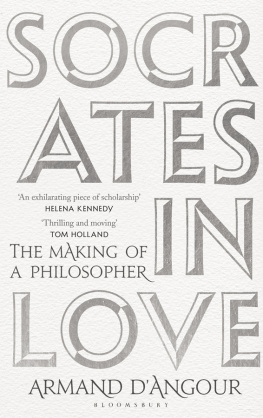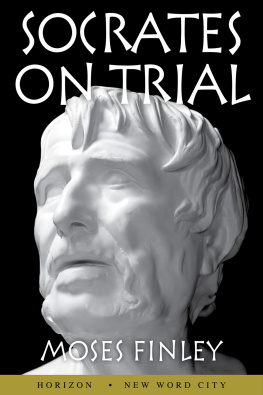olam ha-zeh volam ha-ba:
This World and the World to
Come in Jewish Belief and Practice
Studies in Jewish Civilization
Volume 28
Proceedings of the Twenty-Eighth Annual
Symposium of the Klutznick Chair
in Jewish Civilization,
the Harris Center for Judaic Studies,
and the Schwalb Center
for Israel and Jewish Studies
October 2526, 2015
Other volumes in the
Studies in Jewish Civilization Series
Distributed by the Purdue University Press
2010 Rites of Passage:
How Todays Jews Celebrate, Commemorate, and Commiserate
2011 Jews and Humor
2012 Jews in the Gym:
Judaism, Sports, and Athletics
2013 Fashioning Jews:
Clothing, Culture, and Commerce
2014 Who Is a Jew?
Reflections on History, Religion, and Culture
2015 Wealth and Poverty in Jewish Tradition
2016 Mishpachah:
The Jewish Family in Tradition and in Transition
olam ha-zeh volam ha-ba:
This World and the World to
Come in Jewish Belief and Practice
Studies in Jewish Civilization
Volume 28
Editor:
Leonard J. Greenspoon
The Klutznick Chair in Jewish Civilization
Purdue University Press
West Lafayette, Indiana
Copyright 2017 by Creighton University
Published by Purdue University Press
All rights reserved
Manufactured in the United States of America
Library of Congress Cataloging-in-Publication Data
Names: Greenspoon, Leonard J. (Leonard Jay), editor.
Title: olam ha-zeh volam ha-ba : this world and the world to come in Jewish belief and practice / edited by Leonard Greenspoon.
Description: West Lafayette, Indiana : Purdue University Press, [2017] | Series: Studies in Jewish Civilization | Includes bibliographical references.
Identifiers: LCCN 2017031449 | ISBN 9781557537928 (pbk. : alk. paper) | ISBN 9781612495132 (epdf) | ISBN 9781612495149 (epub)
Subjects: LCSH: Future lifeJudaismHistory of doctrines. | Eschatology, JewishHistory of doctrines. | ImmortalityJudaismHistory of doctrines. | Resurrection (Jewish theology)History of doctrines.
Classification: LCC BM635 .O43 2017 | DDC 296.3/3dc23 LC record available at https://lccn.loc.gov/2017031449
No part of Studies in Jewish Civilization (ISSN 1070-8510) volume 28 may be reproduced or transmitted in any form or by any means, electronic or mechanical, including photocopying, recording, or any information storage and retrieval system, without permission in writing from the publisher, except in the case of brief quotations embodied in critical articles and reviews.
In Memory of
Moshe Gershovitz
With deep affection and warm memories, we dedicate this volume
to our colleague Moshe Gershovitz, who directed the Schwalb Center
at the University of Nebraska at Omaha. His death earlier this year
saddened us all. May his life inspire us to be and to do the very best we can.
Table of Contents
The End of the World and the World to Come: What Apocalyptic Literature Says about the Time After the End-Time
Dereck Daschke
Warriors, Wives, and Wisdom: This World and the World to Come in the (So-Called) Apocrypha
Nicolae Roddy
The Afterlife in the Septuagint
Leonard Greenspoon
Rabbi Akiva, Other Martyrs, and Socrates: On Life, Death, and Life After Life
Naftali Rothenberg
Heaven on Earth: The World to Come and Its (Dis)locations
Christine Hayes
Olam Ha-ba in Rabbinic Literature: A Functional Reading
Dov Weiss
Dining In(to) the World to Come
Jordan D. Rosenblum
Whats for Dinner in Olam Ha-ba? Why Do We Care in Olam Ha-zeh?: Medieval Jewish Ideas about Meals in the World to Come in R. Bahya ben Ashers Shulhan Shel Arba
Jonathan Brumberg-Kraus
The Dybbuk: The Origins and History of a Concept
Morris M. Faierstein
Tasting Heaven: Wine and the World to Come from the Talmud to Safed
Vadim Putzu
Worlds to Come Between East and West: Immortality and the Rise of Modern Jewish Thought
Elias Sacks
Emmanuel Levinass Messianism and the World to Come: A Gnostic-Philosophical Reading of Tractate Sanhedrin 96b99a
Federico Dal Bo
The 28th Annual Symposium on Jewish Civilization took place on October 25 and October 26, 2015, in Omaha and Lincoln, Nebraska. The title of the symposium, from which this volume also takes its name, is olam ha-zeh volam ha-ba: This World and the World to Come in Jewish Belief and Practice.
Anyone who reads carefully and has a phenomenal memory (that sounds a lot like me!) will observe that the symposium has formally changed its name yet once again. Rather than take its name from the expanding list of academic sponsors, the symposium now proclaims in its title what it doesand has always done: provide an opportunity for the exchange and interchange of information about a different aspect of Jewish civilization each year.
Thankfully, our major sponsors remain: the Klutznick Chair in Jewish Civilization at Creighton University; the Kripke Center for the Study of Society and Religion, also at Creighton; the Harris Center for Judaic Studies at University of Nebraska-Lincoln; the Schwalb Center for Israel and Jewish Studies at the University of Nebraska at Omaha; and the Jewish Federation of Omaha.
As in past years, much of the success of this symposium is due to the unwavering support of colleagues: Dr. Ronald Simkins, of the Kripke Center; Drs. Jean Cahan and Sidnie White Crawford, of the Harris Center; and Drs. Moshe Gershovitz and Curtis Hutt, of the Schwalb Center. Colleen Hastings, administrative assistant for the Klutznick Chair and the Kripke Center, continues her invaluable contributions at all stages in the planning and implementation of the symposium and in preparing this volume for publication. I also offer warm thanks to Kasey De Goey, staff assistant for the Schwalb Center, who ensures, among many other things, that the Sunday morning symposium session at University of Nebraska at Omaha runs smoothly. Equally efficient and dependable is Mary Sue Grossman, who is affiliated with the Jewish Federation of Omaha.
With this volume, we are completing eight years in our ongoing relationship with the Purdue University Press. Its staff, under the previous director Charles Watkinson and his successor Peter Froehlich, continues to make us feel welcome in every possible way. We look forward to many more years of collaboration with the press.
Additional generous support is provided by:
Creighton University Lectures, Films and Concerts
The Creighton College of Arts and Sciences
The Ike and Roz Friedman Foundation
The Riekes Family
The Henry Monsky Lodge of Bnai Brith
Gary and Karen Javitch
The Drs. Bernard H. and Bruce S. Bloom Memorial Endowment
And others.
Leonard J. Greenspoon
Omaha, Nebraska
March 2017
When I was growing up in the 1950s and 1960s (chronological point of reference: I celebrated my bar mitzvah in January 1959), I was regular and punctual in my attendance at Junior Congregation on Saturday mornings and religious school on Sunday mornings and twice during the weekday. (Yes! They worked us hard in those days.) I attended Beth El, the Conservative synagogue in Richmond, Virginia.



